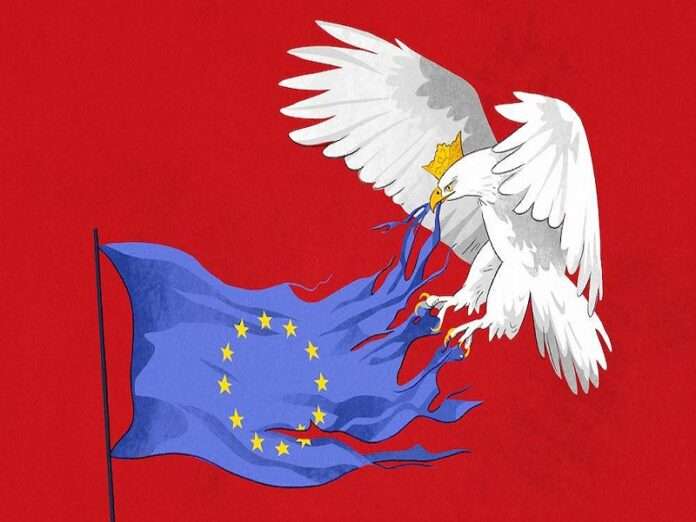Polish Prime Minister Donald Tusk reaffirmed his position from late last year that his country won’t dispatch peacekeepers to Ukraine, which followed new Secretary of Defense Pete Hegseth declaring that the US won’t extend Article 5 guarantees to any NATO members that send troops there. Tusk’s Defense Minister Wladyslaw Kosiniak-Kamysz then drew attention to how Polish soldiers in Ukraine could escalate tensions with Russia, an obvious observation of course but one that Poland had hitherto never shared.
Poland’s newfound pragmatism is attributable to political calculations ahead of May’s presidential election. The ruling liberal-globalists want to replace the outgoing (and very imperfect) conservative president with one of their own in order to remove this obstacle to their plans for transforming Polish society. They’re therefore compelled to respond to worsening public opinion on Ukraine by precluding the dispatch of peacekeepers lest their candidate lose May’s election if they warmonger.
Poles’ views towards Ukraine have changed so much that Politico just published a detailed article about this here, where they cite the latest opinion polling from a reputable Polish research center showing that “only one in four Poles has a positive opinion of Ukrainians, while nearly a third hold a negative view.” In connection with that, a similarly reputable institution’s polling from last summer showed that only 14% support their troops deploying to Ukraine, which might be even less now after all that’s happened.
In brief, the revival of the Volhynia Genocide dispute combined with Ukrainian ingratitude to Poland after Kosiniak-Kamysz revealed that his country had maxed out its pro bono military aid to toxify mutual perceptions, with this being much more pronounced in Polish society than in the Ukrainian one. This shift resulted in Foreign Minister Radek Sikorski scrapping his earlier proposal for Poland to shoot down Russian missiles over Western Ukraine on the pretext of protecting its nuclear power plants.
The ruling liberal-globalists’ stance towards Ukraine then shifted so dramatically that Deputy Prime Minister Krzysztof Gawkowski from the Left (“Lewica”) wing of their parliamentary coalition accused Zelensky in early November of wanting to drag Poland into a war with Russia. Kosiniak-Kamysz then reminded everyone earlier this week of conservative grey cardinal Jaroslaw Kaczynski’s spring 2022 proposal to dispatch troops to Ukraine, a position that he himself no longer holds, Kaczynski said.
Kaczynski’s candidate for president also came out against sending their country’s soldiers there, thus showing how Poland’s ruling duopoly of the liberal-globalists and (very imperfect) conservatives is now competing with one another over who’s more likely to stay out of that conflict. Each’s previously aggressive position has flipped at some point over the past three years as proven in the preceding two paragraphs, which is the result of most Poles now wanting peace in Ukraine even at Kiev’s expense.
This greatly imperils European warmongers’ plans since Poland’s direct participation in the conflict, even if only in a peacekeeping capacity, is integral to either perpetuating hostilities or rekindling them in the event that a ceasefire is agreed to. Poland is the indisputable leader of the Central & Eastern European region due to its much greater population, stronger economy, and larger military, not to mention the civilizational legacy that its erstwhile Commonwealth left in some of these countries to this day.
Its leadership’s decision to restrict their country’s participation in the conflict to a logistical role accordingly reshapes scenario forecasts. This means that only Western European countries might take part in any peacekeeping role, but their respective leaderships are just as sensitive to worsening public opinion on Ukraine as Poland’s, perhaps even more so given their propensity for early elections. It therefore can’t be taken for granted that any of them will go through with this unless Poland does too.
After all, Russian Foreign Minister Sergey Lavrov just confirmed his country’s position that “the presence of armed forces from NATO countries, even under the EU flag or as part of national contingents, is completely unacceptable to us.” Recalling how Hegseth recently declared that the US won’t extend Article 5 guarantees to any NATO members that send troops there, and keeping in mind the significance of traditionally anti-Russian Poland sitting on the sidelines, Western Europe might reconsider its plans.
If that comes to pass and none of them risk provoking Trump’s wrath or a hot war with Russia by unilaterally dispatching troops to Ukraine, then that would be the result of Poland’s newfound pragmatism, which is largely due to worsening public opinion on Ukraine as was explained. There’s of course the chance that the liberal-globalists capture the presidency after May’s election and then capitulate to the European warmongers, but that would risk them losing 2027’s parliamentary elections.
In fact, there’s even the possibility that their ruling parliamentary coalition collapses as a result and early elections are called shortly after such a fateful decision might be made, which could lead to the (very imperfect) conservative half of the Polish duopoly replacing them. There’s also the possibility that Confederation’s populist-nationalists, whose presidential candidate reached an historic high of 16,8% in the latest poll, make a surprise showing to emerge as a powerful independent third force in parliament.
These credible political risks might convince the liberal-globalists to keep their pledge not to deploy any troops to Ukraine no matter the pressure upon them. That would worsen their ties with Western Europe while their ties with Russia show no signs of improvement, thus leading to Poland’s relative isolation from continental affairs. As was just explained here, that could lead to the US exploiting Poland’s position to divide-and-rule Europe after the Ukrainian Conflict ends, which observers should keep a close eye on.







